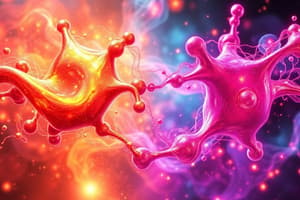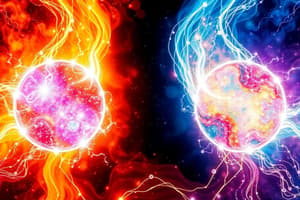Podcast
Questions and Answers
What happens to a substance during oxidation in a redox reaction?
What happens to a substance during oxidation in a redox reaction?
- It loses electrons. (correct)
- It becomes an oxidizing agent.
- It gains electrons.
- It maintains its oxidation state.
Which of the following is true about reducing agents?
Which of the following is true about reducing agents?
- They facilitate the reduction of another substance.
- They are oxidized in the process. (correct)
- They have a low affinity for electrons.
- They gain electrons during the reaction.
What is the oxidation state of oxygen in most compounds?
What is the oxidation state of oxygen in most compounds?
- 0
- +1
- -2 (correct)
- -1
In redox reactions, what characterizes the reducing agent?
In redox reactions, what characterizes the reducing agent?
Which of the following statements describes an oxidizing agent?
Which of the following statements describes an oxidizing agent?
What is the general form of a reduction reaction?
What is the general form of a reduction reaction?
What is characteristically true of an oxidizing agent?
What is characteristically true of an oxidizing agent?
Which rule correctly assigns the oxidation state of a monoatomic ion?
Which rule correctly assigns the oxidation state of a monoatomic ion?
Which of the following is a common oxidizing agent used for disinfection?
Which of the following is a common oxidizing agent used for disinfection?
How do oxidizing agents typically behave in terms of oxidation states?
How do oxidizing agents typically behave in terms of oxidation states?
Why is understanding oxidation states important in redox reactions?
Why is understanding oxidation states important in redox reactions?
What is a characteristic of a reducing agent?
What is a characteristic of a reducing agent?
In the reaction between zinc and copper(II) sulfate, what is the reducing agent?
In the reaction between zinc and copper(II) sulfate, what is the reducing agent?
What role does potassium permanganate (KMnO₄) play in acidic solutions?
What role does potassium permanganate (KMnO₄) play in acidic solutions?
Which substance is commonly used in organic chemistry as a reducing agent?
Which substance is commonly used in organic chemistry as a reducing agent?
What would be an application of reducing agents in industrial processes?
What would be an application of reducing agents in industrial processes?
Which of the following represents a typical redox reaction process?
Which of the following represents a typical redox reaction process?
Which oxidizing agent is commonly associated with the process of bleaching?
Which oxidizing agent is commonly associated with the process of bleaching?
How is hydrogen gas characterized in the context of redox reactions?
How is hydrogen gas characterized in the context of redox reactions?
When identifying agents in a redox reaction, which statement is correct?
When identifying agents in a redox reaction, which statement is correct?
Flashcards are hidden until you start studying
Study Notes
Redox Reactions and Electron Transfer
- Redox reactions involve the transfer of electrons between substances.
- One substance loses electrons and becomes oxidized, while the other gains electrons and becomes reduced.
Oxidation and Reduction
- Oxidation: Process where a substance loses electrons and its oxidation state increases.
- Reduction: Process where a substance gains electrons and its oxidation state decreases.
Identifying Oxidizing and Reducing Agents
- Oxidizing Agent: The substance that gains electrons and is reduced. It causes the oxidation of another substance.
- Reducing Agent: The substance that loses electrons and is oxidized. It causes the reduction of another substance.
Characteristics of Oxidizing Agents
- Have a high affinity for electrons (they want to gain electrons).
- Are reduced themselves during the reaction.
- Often contain elements with high oxidation states.
Common Oxidizing Agents
- Oxygen (O₂): Essential in combustion and respiration.
- Chlorine (Cl₂): Used for disinfection and bleach production.
- Potassium Permanganate (KMnO₄): Strong oxidizing agent, often used in titrations.
- Nitric Acid (HNO₃): Strong oxidizing agent, used in fertilizer and explosive production.
Applications of Oxidizing Agents
- Bleaching: Chlorine and hydrogen peroxide are used in bleaching textiles and paper.
- Disinfection: Chlorine and ozone are used for water disinfection.
- Organic Synthesis: Used for conversions like alcohols to aldehydes, ketones, or carboxylic acids.
Characteristics of Reducing Agents
- Tend to donate electrons.
- Are oxidized themselves during the reaction.
- Often contain elements with low oxidation states.
Common Reducing Agents
- Hydrogen Gas (H₂): Important reducing agent in industrial processes like oil hydrogenation.
- Carbon Monoxide (CO): Used in metallurgy to extract metals from their ores.
- Sodium Borohydride (NaBH₄): Used as a reducing agent in organic chemistry.
- Zinc Metal (Zn): Used in chemical reactions and galvanic cells.
Applications of Reducing Agents
- Metallurgy: Used to extract metals from their ores.
- Organic Synthesis: Used to produce alcohols from carbonyl compounds (aldehydes and ketones).
- Hydrogenation: Used to add hydrogen to unsaturated fats and oils, making them saturated.
Determining Oxidizing and Reducing Agents in a Reaction
- Step 1: Assign oxidation states to all elements in reactants and products.
- Step 2: Identify changes in oxidation states to determine which elements are oxidized and which are reduced.
- Step 3: Identify the agents:
- Oxidizing Agent: The substance that is reduced.
- Reducing Agent: The substance that is oxidized.
Studying That Suits You
Use AI to generate personalized quizzes and flashcards to suit your learning preferences.




